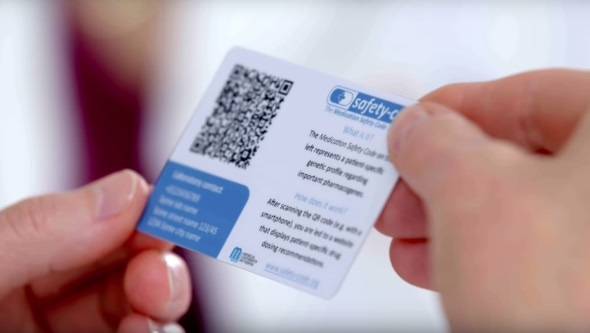Jul 10 2018
In a project funded by the Austrian Science Fund FWF, a research group from Vienna investigated how genetic data can be made accessible in medical practice in order to improve the safety and effectiveness of medication.

Genetic data, stored as QR code on a bank card. Quelle: U-PGx project / Federal Institute for Drugs and Medical Devices, Germany
Not every type of medication has the same effect on everyone – a fact known to many people from personal experience. The phenomenon is often due to genetic differences between individuals, and up until now there was practically nothing to be done about it. In a project funded by the Austrian Science Fund FWF, a research group led by the biomedical informatics specialist Matthias Samwald from the Medical University of Vienna has now been investigating how existing knowledge about genetic factors influencing the safety and effectiveness of medication can be processed to benefit medical practice.
“Personalized medicine is what we are striving for here”, explains Samwald in the interview with scilog. “Two people with the same diagnosis are prescribed the same medication at the same dosage. Perhaps they even have the same weight and height, but their response to the drug may still be quite different. One person experiences a beneficial effect, while the other suffers from side effects.” One of the reasons for this variability is genetics, says Samwald. “We hope that these individual differences can be used to tailor therapies in a better way.” He maintains that it can be done even on the basis of currently available knowledge: “In addition, a lot of evidence has already been collected in recent decades, in research, but also in clinical cases”, explains the researcher. While this makes the situation seem quite promising, Samwald points out that there are some barriers to implementation in practice. One central question is: “How do you integrate this into existing workflows?”
Drugs in question are prescribed frequently
The first question to be tackled was how often drugs are prescribed for which data on the influence of genetic differences on their effectiveness is already available. “We looked at large data sets of patients, one with 73 million people in the USA and one with 6.8 million people in Austria. In a period of four years, more than 50% of the people over 65 were prescribed one of the drugs in question, and 30% even three or more”, reports Samwald. Among younger people between 40 and 64 years of age, the percentage is still 42.
The results imply that it makes sense to subject these groups to genetic testing to determine the factors relevant to the respective medication. Such tests exist, but right now the cost has to be borne by the individuals concerned themselves. “There are already cost efficient ways of testing several factors at once, at a cost of less than 100 euros per person.” Accordingly, one objective of the project was to collect sufficient data to enable health insurers to get an idea of the situation. “Ultimately, this can save them money”, promises the researcher.
An app for the consulting room
But having the data available is not enough, says Samwald:
The question is how to make it really visible at the point-of-care, where decisions have to be made. There is no point in providing the genetic raw data; one must also have a way to interpret it clearly. These are actually questions that can be answered by good and improved information technologies."
Now the knowledge already described in the medical guidelines must be applied in practice. In order to do that, the researchers developed a system to translate pharmacogenetic knowledge into formalized computer languages. One of the positive outcomes was that they were able to show that the system helps to reveal contradictions in the underlying medical knowledge and to draw new conclusions. In practical terms, the system is to be made available in the form of a mobile phone app that interprets this data and offers assistance in decision-making.
Data privacy
Samwald and his group have also given some thought to data protection. “Obviously, health data, and especially genetic data, is particularly sensitive. We have solved this by giving the persons concerned complete control over their genetic data.” The results of the genetic test were stored in compressed form in a QR code – a two-dimensional barcode, so to speak – that can be read by conventional mobile phones. “In this way, patients have the same control over the data as over the rest of their wallet.” This approach does not require a centralized system.
EU project
Following the basic research project funded by the FWF, the research is now being continued in an EU-funded project where Samwald’s group is collaborating with various partners, also from the private sector, in an attempt to translate the findings into a medical device that can undergo clinical testing.